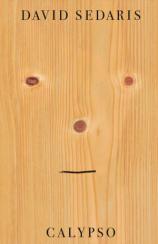Calypso
Review
Calypso
A new book from David Sedaris is always cause for celebration. Fans count down the days to its publication like children eagerly awaiting Christmas. In his latest outing, CALYPSO, he trenchantly tackles the mundane and the mortal, the ephemeral and the all-too-real, all with his trademark acerbic humor. Sedaris is known for his astute dispatches about his life, travels and observations. He talks about life in the English countryside and his recent embrace of technology, especially when it comes to his Fitbit. But as usual, it’s his essays about his family that really packs the emotional punch.
Sedaris, now 61, reflects on the corollaries of time on himself as well as his siblings: “It’s not like we don’t see it now. We’re not pessimists, exactly, but in late middle age, when you envision your life ten years down the line, you’re more likely to see a bedpan than a Tony Award.” He keenly observes the differences in his 95-year-old father, the difficulty in finding safe topics to discuss, and the looming specter of time (or lack thereof) hanging over each interaction: “…The silence my father and I inflicted on each other back then is now exacerbated by his advanced age. Every time I see him could be the last, and the pressure I feel to make our conversation meaningful paralyzes me.”
"In this 10th outing, we see Sedaris’ most mature, most raw, perhaps even more 'naked' than NAKED work. It’s these profound, barbed observations, these accounts from the ridiculous to the sublime, that keep us coming back."
In many of these essays, Sedaris demonstrates how time and maturity can alter certain memories, sometimes softening them, and bringing others into clearer focus, especially with his mother’s alcoholism. In “Why Aren’t You Laughing?” he segues from talking about his love of the TV show “Intervention” to his realization about his mother’s drinking: “It’s a hard word to use for someone you love, and so my family avoided it. Rather, we’d whisper, among ourselves, that mom ‘had a problem,’ and that she ‘could stand to cut back’…. I think my mother was lonely without her children --- her fan club. But I think she drank because she was an alcoholic.” Not one to give credence to stories about ghosts (see essays “Boo-Hooey” and “The Spirit World”), Sedaris admits that his mom’s drinking had turned his family’s home into a metaphoric haunted house: “It was like the ‘Addams Family’ house, which would have been fine had it still been merry, but it wasn’t anymore. Our mother became the living ghost that haunted it, gaunt now and rattling ice cubes instead of chains.”
But Sedaris realizes, in the wake of his mother’s death from cancer in 1991, that she was still the glue that kept their family intact. In an effort to see his father and siblings more regularly, he and his partner, Hugh, decide to invest in a vacation home on Emerald Isle off the coast of North Carolina, where he used to go on family vacations as a child. Driving with his father and Hugh, they pass a condo complex where they had stayed during the 1980s.
“Hey, [his father] said, ‘that’s where we used to go when we were a family.”
“Well, aren’t you still a family?” Hugh asked.
“I meant when Sharon was alive.”
“Though I hated hearing him say that, I couldn’t deny the truth of it. Our mother was the one who held us all together. After her death we were like a fistful of damp soil, loose bits breaking off with no one to press them back in.” So, in the name of family, they bought this house, which they name the “Sea Section.”
But the essays that are the most heart-wrenching are the ones that deal with Sedaris’ younger sister, Tiffany, who committed suicide in 2013 (“Now We Are Five,” “A House Divided” and, especially, “The Spirit World”). After years of sporadic contact, he hadn’t seen Tiffany in seven years, and had a hard time imagining keeping that kind of distance between himself and his family: “How could anyone purposefully leave us --- us, of all people? This is how I thought of it, for though I’ve often lost faith in myself, I’ve never lost faith in my family, in my certainty that we are fundamentally better than everyone else. It’s an archaic belief, one I haven’t seriously reconsidered since my late teens, but still I hold it. Ours is the only club I’d ever wanted to be a member of, so I couldn’t imagine quitting.”
In “The Spirit World,” his sister, actress Amy Sedaris, relates the information gleaned from a visit with a psychic, where she was told that Tiffany is fine and isn’t mad at her brother anymore: “Perhaps, like the psychic, they were just telling me what I needed to hear, something to ease my conscience and make me feel that underneath it all I’m no different from anyone else. They’ve always done that for me, my family. It’s what keeps me coming back.”
In this 10th outing, we see Sedaris’ most mature, most raw, perhaps even more “naked” than NAKED work. It’s these profound, barbed observations, these accounts from the ridiculous to the sublime, that keep us coming back.
Reviewed by Bronwyn Miller on May 30, 2018
Calypso
- Publication Date: June 4, 2019
- Genres: Essays, Humor, Nonfiction
- Paperback: 272 pages
- Publisher: Back Bay Books
- ISBN-10: 0316392421
- ISBN-13: 9780316392426




